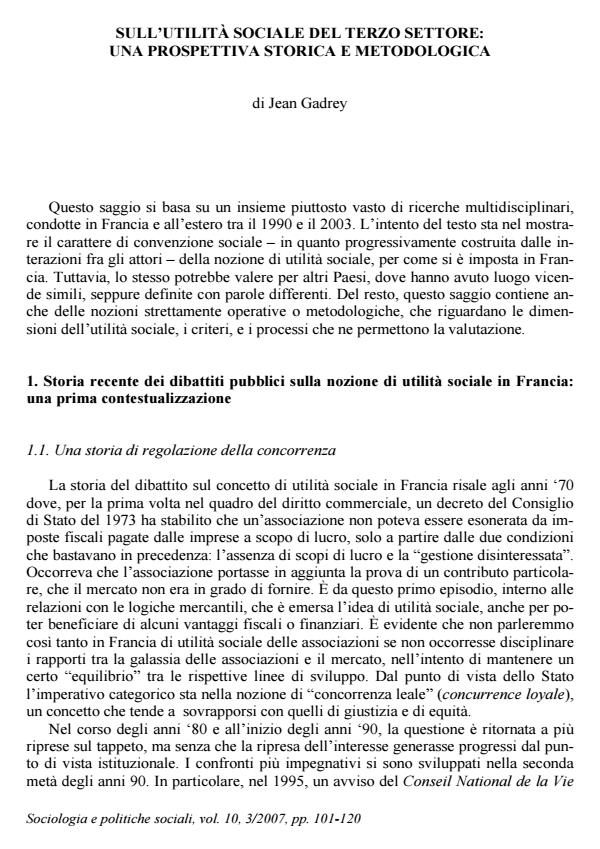Sull'utilità sociale del terzo settore: una prospettiva storica e metodologica
Journal title SOCIOLOGIA E POLITICHE SOCIALI
Author/s Jean Gadrey
Publishing Year 2008 Issue 2007/3
Language Italian Pages 20 P. 101-120 File size 116 KB
DOI
DOI is like a bar code for intellectual property: to have more infomation
click here
Below, you can see the article first page
If you want to buy this article in PDF format, you can do it, following the instructions to buy download credits

FrancoAngeli is member of Publishers International Linking Association, Inc (PILA), a not-for-profit association which run the CrossRef service enabling links to and from online scholarly content.
The aim of this paper is to demonstrate that the notion of social utility is a peculiar social convention elaborated across Europe in the last twenty years. This essay also contains strictly operative and methodological reflexions about the dimensions of social utility, the rationale and processes which permit/enable its evaluation. In particular the Author develops a new grid able to operazionalize and evaluate the outcome of the third sector’s activities. Besides the economical aspects of social utility and the political one, Gadrey develops a third level of evaluation focusing on the social bond and participatory democracy. A new approach about the idea of social utility has developed on the threefold ground of research, political action and associative action. This doesn’t mean that idea is valid in itself. In fact, it is at the centre of a debate and it hasn’t the same meaning for all the actors, especially for the political and economical one. Some associations, and some researchers, don’t accept it. In the process of the social construction of socio-political conventions, things can evolve in a way that is more or less democratic, and more or less favourable to values some which happen to be supported by some and contested by others. Besides, this innovations may drive aground without taking off, because other solutions can be found, or because the status quo could be preferred or imposed by some actors. Anyway, this is not the most probable outcome, especially if the associative and cooperative sector will continue to prove its dinamism, as it has done lately. A further step could be to represent social utility as a value which goes over its current specific ground of application, imposing itself as an instrument for the achievement of new rights and as a ground for elaborating a well-articualted and multidimensional image of social and personal wealth.
Jean Gadrey, Sull'utilità sociale del terzo settore: una prospettiva storica e metodologica in "SOCIOLOGIA E POLITICHE SOCIALI" 3/2007, pp 101-120, DOI: